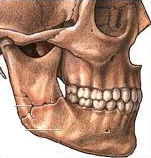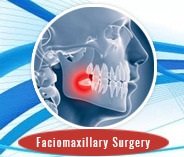A broken jaw (or mandibular fracture) is a common facial injury. Only the nose is broken more frequently. A broken jaw is the tenth most common fractured bone in the human body. Fractures (these are breaks in the bone) are generally the result of a direct force or trauma to the jawbone.
The jawbone, or mandible, is the largest and main bone of the lower part of the face. The chief areas of the mandible bone are the body (chin out to the jaw angle) and the 2 upward branches, called the Rami. Typically, jaw fractures require treatment, and surgery is often recommended.

Broken Jaw Causes
- Motor vehicle accidents
- Assaults
- Sports-related injuries
- Falls
Broken Jaw Symptoms
- The most common symptom is jaw pain.
- You may feel that your teeth do not fit together correctly (this is called a malocclusion). You may be unable to open your jaw all the way, have problems speaking, or notice swelling of the jaw.
- Your chin or lower lip may be numb because of damage to a nerve that runs through the mandible.
- Inside the mouth, you may see bleeding or find a change in the normal lineup of teeth. There might also be bruising under the tongue or even a cut in the ear canal due to movement backward of the broken jawbone.
Broken Jaw Treatment
Self-Care at Home: If there is any question that you may have a broken jaw, you need to be checked by a doctor or a dentist specializing in oral surgery. Ice should be applied to the jaw to help control the swelling on your way to be seen by the doctor. Sometimes you will need a paper cup to catch the drool or to spit blood into on the trip to the doctor or emergency department.
Medical Treatment: Many people who have jaw pain will not have a jaw fracture and will be treated with pain medications and instructions to eat a soft diet and to follow up with their doctor.
- Those with fractures require further evaluation. Many fractures of the jawbone are associated with gum problems or tissue damage and should be considered open fractures. They will be treated with antibiotics.
- You may receive a tetanus shot.
- Pain will be addressed and managed effectively.
- Many mandible fractures are stable, and the only treatment required is wiring the upper and lower teeth together. This will most commonly be performed by an oral and maxillofacial surgeon.
- More unstable fractures often require surgery. Surgical methods using plates across the fracture site may allow you to have normal motion of the mandible and to eat shortly after surgery.
Follow-up: Many jaw fractures require surgery. Because of that, you may need to follow up with a surgeon.
- All antibiotics need to be taken as instructed.
- Follow all recommendations on diet.















